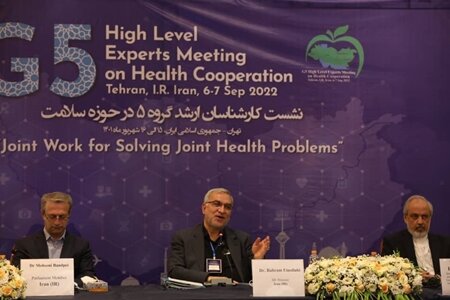G5 expert meeting on health cooperation held in Tehran

TEHRAN – The subregional workshop for G5 countries (Afghanistan, Iran, Iraq, Pakistan, plus the World Health Organization) on health cooperation started in Tehran on Tuesday.
Some health issues such as coronavirus are global problems, but each region of the world has its own problems in the health sector, which must be solved with the cooperation of neighbors, Health Minister Bahram Einollahi said at the opening ceremony of the meeting.
In today's world, every country must monitor the health of other countries, especially its neighborhood, to ensure its health and to prevent the spread of diseases, he stated.
Iran initiated the establishment of the G5 in 2005 to promote subregional cooperation in health among the group of four countries – Afghanistan, Islamic Republic of Iran, Iraq, and Pakistan – plus the World Health Organization.Before COVID, countries were not so sensitive to health and did not know its importance. After the pandemic, everyone understood that health is one of the infrastructure issues and that the social, cultural, and economic progress of societies depends on paying attention to health.
The G5 countries have numerous common historical, ethnic, geographical, and cultural ties that have existed for many centuries.
“We should be in charge of managing the health of the 300 million population of the region,” he highlighted.
Some countries have removed the apparent and geographical borders in the field of health, and the G5 can expand its scope of activity beyond the official borders in order to exchange science, scientists, and students.
Iran initiated the establishment of the G5 in 2005 to promote subregional cooperation in health among the group of four countries – Afghanistan, Islamic Republic of Iran, Iraq, and Pakistan – plus the World Health Organization as the fifth member of this group to provide technical support in improving this collaboration.
Several activities have already been taken under this initiative, with the Islamic Republic of Iran taking responsibility for serving as its secretariat.
The first subregional workshop for G5 countries on health system strengthening was hosted by the Ministry of National Health Services, Regulations and Coordination of Pakistan on November 19–20, 2013 in Islamabad, Pakistan.
Exchanging experiences on issues related to moving towards universal health coverage; developing national roadmaps and strategies for improving service delivery, population coverage, and financial risk protection; assisting each other in health workforce capacity development activities, health system research, national health accounts, and policy development; developing measurable indicators related to three dimensions of universal health coverage are among the goals of this two-day meeting.
In June 2021, Ahmed al-Mandhari, the World Health Organization director for Eastern Mediterranean Region, said the Islamic Republic of Iran is a role model for primary health care.
For the past four decades, its PHC network has aimed to ensure that people have timely access to affordable, accessible, and acceptable essential health services, he explained.
FB/MG
